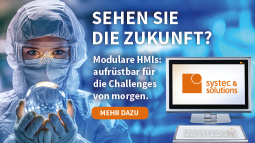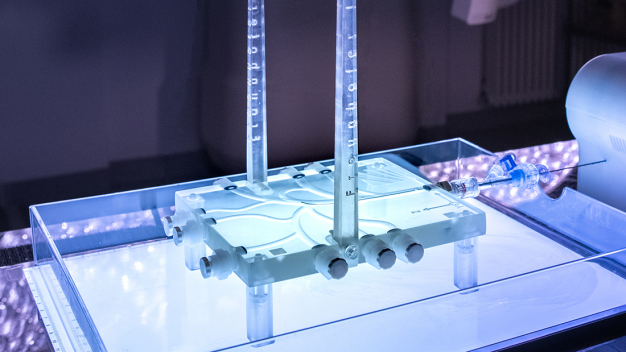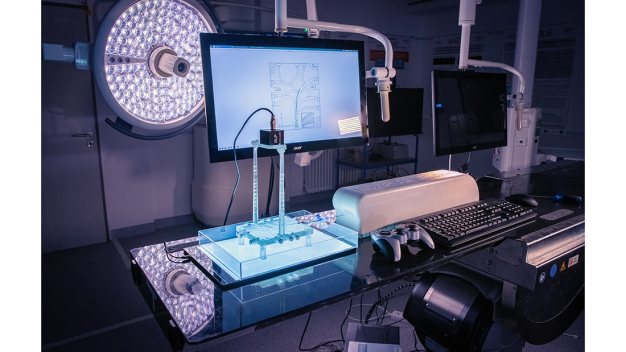- R+D & Community of Interest
Artificial Intelligence for Medical Technology
Small and medium medical-technology enterprises (SME) in Baden Württemberg are set to soon use artifical intelligence (AI) methods for the improvement and new development of their products. The expertise for this has been provided by the Project Group for Automation in Medicine and Biotechnology (PAMB) at Fraunhofer IPA and the Application Center for Intelligent Machines in Medical Technology (ANIMMED) at Mannheim University Hospital. As part of „Forum Gesundheitsstandort Baden-Württemberg“, the state of Baden-Württemberg is providing ANIMMED and a further seven projects with EUR 13.9 million in funding.
AI methods enable machines to autonomously operate, carry out analyses and make decisions in complex situations. These characteristics make AI systems particularly relevant for use in medicine. In diagnostics, AI methods already make it possible to analyse vast quantities of data in practice, which a human being would be unable to handle.
Medical devices can also be automated by using AI methods. Automated devices are significantly more efficient in clinical applications, supporting doctors more effectively. For current medical applications, the automation of medical devices seems only possible using AI methods. This is due to the natural diversity of the human organism, its susceptibility to injury and its complex biology. Humans can cope with this complexity and variability. With the help of intelligent machines, humans would still make the decisions and manage the clinical process, but they could use their resources signficantly more efficient. Therefore, automation using AI systems is viewed today as the technological key to the efficient precision medicine of the future.
Despite these expectations, AI only features in clinical applications on rare and limited occasions, with the exception of a few areas of diagnostics such as radiology and dermatology. Yet the potential inherent in AI for the operation of medical devices currently remains largely undeveloped in clinical practice.
A range of aspects enable AI solutions to be implemented in medical technology. There are available AI software libraries and algorithms as well as ample storage capacity and the necessary computing power. In addition, efficient measuring technology and affordable computer technology as well as new materials, drive concepts and clinical approaches all mean that AI can be usefully incorporated in medical devices and instruments.
Advantages of AI in medical technology
Various projects undertaken by the Mannheim Project Group have shown that AI is of the utmost importance in hospitals for the intelligent operation of machines, i.e. instruments, devices and systems such as robots. In future, with the use of AI, machines will be able to support doctors with critical tasks and managing complex procedures in hospital, in that it would even be possible to automate processes, relieving hospital staff of certain tasks where required. As a result, the optimum in care, diagnosis and intervention tailored to the individual patient can be achieved, enhancing the efficacity of these aspects of treatment. With this, medical care will remain affordable in the future despite the additional costs incurred for the digital infrastructure required.
Training data are the key
One of the key points of AI application for medical devices is access to training data, as adaptive AI systems for intelligent devices and instruments should be trained with large volumes of valid data. This means that the data represent reality with sufficient accuracy and the calculated result corresponds to relity. Especially for medical technology applications, such large volumes of data can only be obtained in everyday clinical practice or in extremely realistic scenarios and simulations. In most cases, the development of AI systems in medicine fails to meet this requirement. The costs are too high for companies and as a result, a vicious cycle is formed: a lack of available applications means that the feasibility and benefits of AI solutions cannot be sufficiently proven by practical example. This again makes it difficult to develop new applications.
Best practice demonstrators and development methods that reflect clinical practice
Using best practice demonstrators and the range of development methods that reflect clinical practice, ANIMMED is breaking this vicious cycle: using three demonstrators for medical AI systems, it evaluates its own AI development methodology and at the same time uses the results as reference projects. The close network of partners and their location on the campus of the Mannheim Faculty of Medicine (UMM) offers an optimal ecosystem for this purpose. The medical staff and facilities at UMM, the Heinrich-Lanz Center (HLZ) as specialists for data collection from clinical sources and the Fraunhofer Project Group for Automation in Medicine and Biotechnology PAMB with its experience as an AI application developer and operator at the Mannheim Medical Transfer Center M2TC are an established networked structure that forms
the basis for rapid operational project implementation.
Application center for intelligent machines in medical technology (ANIMMED)
The development and application center, which is located on the site of the Fraunhofer Project Group and the HLZ facilitates the use of AI for medical technology. At Mannheim University Hospital, ANIMMED supports medical companies in the development, training and adaptation of AI solutions for intelligent medical devices and instruments.
EUR 13.9 million for healthcare location Baden-Württemberg
In addition to the Application Center for Intelligent Machines in Medical Technology, the Ministry for Economic Affairs has provided a total of EUR 13.9 million to fund a further seven projects. Following approval of the funding by the Council of Ministers on April 21 as part of the „Forum Gesundheitsstandort Baden-Württemberg“, Minister for Economic Affairs Dr. Nicole Hoffmeister-Kraut explained the decision: “Innovative ideas and projects are the key to an effective healthcare sector. We should be constantly developing our skills precisely for times of crisis as well as for the future. With these first eight projects, we are significantly advancing these key technologies – for the wel-fare of our patients as well as for the benefit of the Baden-Württemberg economy.”
![]()
Fraunhofer-Institut für Produktionstechnik und Automatisierung IPA
Nobelstraße 12
70569 Stuttgart
Germany
Phone: +49 711 970 1667
email: joerg-dieter.walz@ipa.fraunhofer.de
Internet: http://www.ipa.fraunhofer.de










